高中英语语法倒装句讲解及练习(附答案)
高中英语语法倒装句讲解及练习(附答案)教学文案
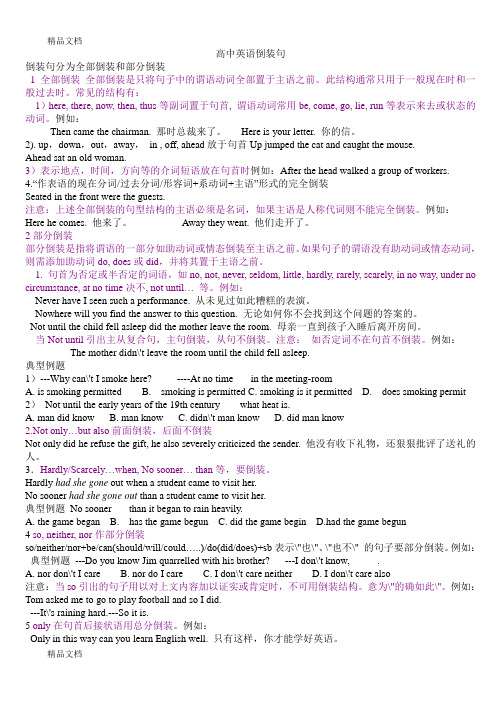
高中英语倒装句倒装句分为全部倒装和部分倒装1全部倒装全部倒装是只将句子中的谓语动词全部置于主语之前。
此结构通常只用于一般现在时和一般过去时。
常见的结构有:1)here, there, now, then, thus等副词置于句首, 谓语动词常用be, come, go, lie, run等表示来去或状态的动词。
例如:Then came the chairman. 那时总裁来了。
Here is your letter. 你的信。
2). up,down,out,away,in , off, ahead放于句首Up jumped the cat and caught the mouse.Ahead sat an old woman.3)表示地点,时间,方向等的介词短语放在句首时例如:After the head walked a group of workers.4.“作表语的现在分词/过去分词/形容词+系动词+主语”形式的完全倒装Seated in the front were the guests.注意:上述全部倒装的句型结构的主语必须是名词,如果主语是人称代词则不能完全倒装。
例如:Here he comes. 他来了。
Away they went. 他们走开了。
2部分倒装部分倒装是指将谓语的一部分如助动词或情态倒装至主语之前。
如果句子的谓语没有助动词或情态动词,则需添加助动词do, does或did,并将其置于主语之前。
1. 句首为否定或半否定的词语,如no, not, never, seldom, little, hardly, rarely, scarely, in no way, under no circumstance, at no time决不, not until… 等。
例如:Never have I seen such a performance. 从未见过如此糟糕的表演。
Nowhere will you find the answer to this question. 无论如何你不会找到这个问题的答案的。
倒装句讲解及练习和答案
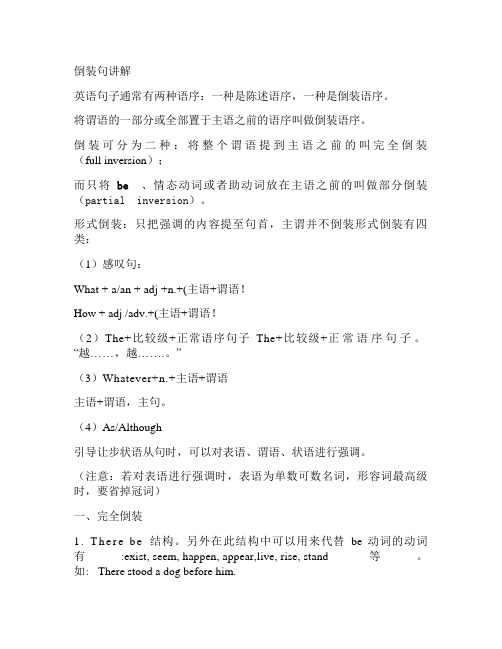
倒装句讲解英语句子通常有两种语序:一种是陈述语序,一种是倒装语序。
将谓语的一部分或全部置于主语之前的语序叫做倒装语序。
倒装可分为二种:将整个谓语提到主语之前的叫完全倒装(full inversion);而只将be 、情态动词或者助动词放在主语之前的叫做部分倒装(partial inversion)。
形式倒装:只把强调的内容提至句首,主谓并不倒装形式倒装有四类:(1)感叹句:What + a/an + adj +n.+(主语+谓语!How + adj /adv.+(主语+谓语!(2)The+比较级+正常语序句子The+比较级+正常语序句子。
“越……,越…….。
”(3)Whatever+n.+主语+谓语主语+谓语,主句。
(4)As/Although引导让步状语从句时,可以对表语、谓语、状语进行强调。
(注意:若对表语进行强调时,表语为单数可数名词,形容词最高级时,要省掉冠词)一、完全倒装1.T h e r e b e结构。
另外在此结构中可以用来代替be动词的动词有:exist, seem, happen, appear,live, rise, stand等。
如: There stood a dog before him.There exist different opinions on this question.2 (1.在以here、there、n o w、then等副词开头的句子里。
“Here, There, Now, Then + come (或be,go,lie,run + 主语"结构。
Here comes the old lady!Then came the hour we had been looking forward to.There comes the bus.Now comes your turn.如果主语是人称代词,就不用倒装。
如:Here you are.There she comes.(2.表示方向的副词out, in, up, down等置于句首,要用全部倒装。
高中英语倒装句讲解以及习题(附答案)
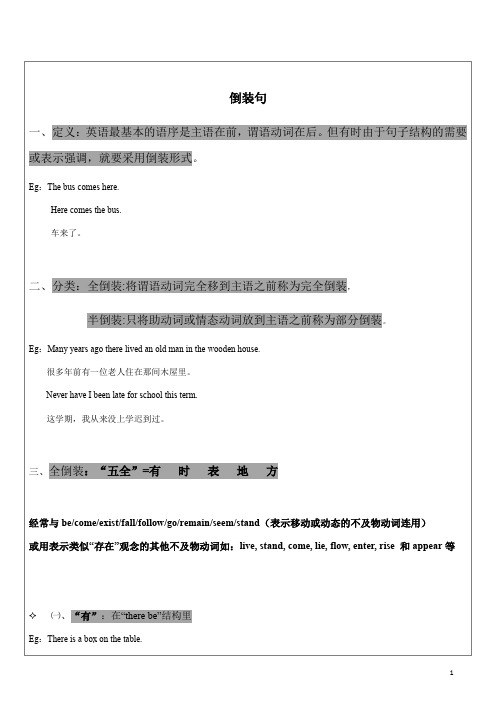
倒装句一、定义:英语最基本的语序是主语在前,谓语动词在后。
但有时由于句子结构的需要或表示强调,就要采用倒装形式。
Eg:The bus comes here.Here comes the bus.车来了。
二、分类:全倒装:将谓语动词完全移到主语之前称为完全倒装,半倒装:只将助动词或情态动词放到主语之前称为部分倒装。
Eg:Many years ago there lived an old man in the wooden house.很多年前有一位老人住在那间木屋里。
Never have I been late for school this term.这学期,我从来没上学迟到过。
三、全倒装:“五全”=有时表地方经常与be/come/exist/fall/follow/go/remain/seem/stand(表示移动或动态的不及物动词连用)或用表示类似“存在”观念的其他不及物动词如:live, stand, come, lie, flow, enter, rise 和appear等㈠、“有”:在“there be”结构里Eg:There is a box on the table.桌子上面有一个盒子。
✧㈡、“时”:表示时间副词,如:now,then,Eg:Now comes your turn.现在轮到你了。
✧㈢、“表”:表语放句子前,“表语+系动词+主语”的结构Eg:Present at the party were Mr. Green and many other guests.格林先生和其他的客人在这个聚会上。
Seated on the ground are a group of young men.一群年轻人坐在了地上。
✧㈣、“地”:地点状语放在句首Eg:In south of the river lies a small factory.小工厂位于河的南方。
From the valley came a cry.山谷传来一阵哭声。
高考英语倒装句(语法讲义+练习+答案)语法复习

高考英语倒装句(语法讲义+练习+答案)语法复习预览说明:预览图片所展示的格式为文档的源格式展示,下载源文件没有水印,内容可编辑和复制倒装句讲解部分倒装1. 否定意义的词或短语,位于句首,需部分倒装。
如否定词no, not, never;半否定词hardly, seldom, scarcely, barely, rarely, little, few;no合成的代词或副词nobody, nothing, nowhere;否定的短语not until, by no means, in no way, in no time, under no circumstances。
No word did he say before he left.Never had I heard or seen such a thing.Little did I know about it.Nowhere will you find better roses than theses.Not until he went abroad did he know the truth.By no means shall we give up.2. not only (merely, alone, simply)…(but) also 连接两个并列分句,前一分句需倒装。
Not only did we lose our money, but we also came close to losing our lives.Not simply is this book interesting but also instructive.注意:Not only you but also I(连接并列主语不倒装)will attend the meeting.3. neither…nor连接两个并列分句,前后两个分句都倒装。
Neither did they write nor did they telephone.Neither is he wrong nor are you.Neither could I help you, nor could he.Neither French nor German do I know.Neither on Saturday nor on Sunday do we have lessons.注意: Neither you nor I(连接并列主语不倒装) like this book.4. Only + 状语,位于句首,需部分倒装。
高中英语语法倒装句讲解与练习含答案
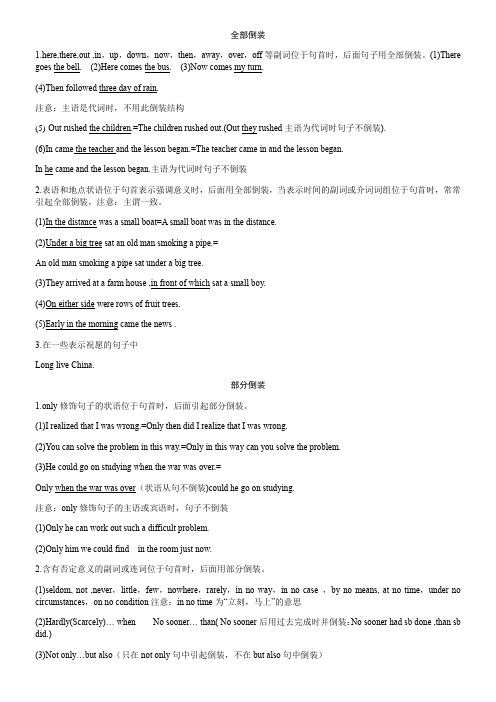
全部倒装1.here,there,out ,in,up,down,now,then,away,over,off等副词位于句首时,后面句子用全部倒装。
(1)There goes the bell. (2)Here comes the bus. (3)Now comes my turn.(4)Then followed three day of rain.注意:主语是代词时,不用此倒装结构(5)Out rushed the children.=The children rushed out.(Out they rushed主语为代词时句子不倒装).(6)In came the teacher and the lesson began.=The teacher came in and the lesson began.In he came and the lesson began.主语为代词时句子不倒装2.表语和地点状语位于句首表示强调意义时,后面用全部倒装,当表示时间的副词或介词词组位于句首时,常常引起全部倒装,注意:主谓一致。
(1)In the distance was a small boat=A small boat was in the distance.(2)Under a big tree sat an old man smoking a pipe.=An old man smoking a pipe sat under a big tree.(3)They arrived at a farm house ,in front of which sat a small boy.(4)On either side were rows of fruit trees.(5)Early in the morning came the news .3.在一些表示祝愿的句子中Long live China.部分倒装1.only修饰句子的状语位于句首时,后面引起部分倒装。
(完整版)倒装句精讲及练习(含答案)

(完整版)倒装句精讲及练习(含答案)倒装句的用法英语倒装句分为两种:1、整个谓语在前的句子,叫完全倒装。
Here comes the car.2、部分谓语(情态动词、助动词、连系动词)在前,谓语的主体部分仍在主语之后的句子,叫部分倒装句。
Only then did he realize that he was wrong.必须弄清的两点:①若有主从句,哪句倒装。
②部分倒装还是完全倒装。
一、表示方位和时间的副词位于句首时(now ,then here ,there,out ,in ,up,down ,away ,back, off,on ), 句子全部倒装。
注:主语是代词时,不倒装。
(如5,6)1. Here comes the bus .2. There goes the bell .3. Away went the students .4. Now comes the chance .Out rushed the children. he rushed.There comes the bus. he comes.注意:1.不能用进行时; 2. 主语为人称代词时不倒装。
二、以介词短语表示的状语,提前位于句首时,全部倒装。
1.In a lecture hall of a university in England sits a professor .2.In front of our school stands a tower .3.By either side of the river grow a lot of apple trees .4.At the top of the mountain stands a temple .5. Among the goods are Christmas trees,flowers and toys.三、表语位于句首时,倒装结构为“表语+连系动词+主语”A: 形容词+连系动词+主语例1.Present at the meeting were Professor White,Professor Smith and many other guests.例2.过去分词+连系动词+主语Gone are the days when they could do what they liked to the Chinese people.四、将so\neither \nor 放在开头,表示“…也(不)…”的意思时,部分倒装注:表示“确实是这样”时,不倒装1.He went to the film last night.So did I .2.You must finish your work ,so must I .3.She is interested in the story ,so am I .4.He didn’t turn up .Neither did his brother .5.His mother told him not to go to the film .So he did.五、在if 条件句中,通常可以省略if ,而将从句倒装条件:在if 条件句,必须含有系动词were, 助动词had 和情态动词should1.Were he younger(=If he were younger ),he would learn skating .2.Should they forget (=If they should forget ) to bring a map with them ,they would get lost in the woods .3.Had they realized (=If they had realized ) how important the task was ,they wouldn’t have refused to accept .4.Were I you ,I would help her .六、否定词或半否定词(never .little ,seldom ,not ,nowhere ,scarely ,few ,by no means ,at no time )位于句首,应部分倒装1.Never have I been there .2.Little did I know about it .3.Seldom did she come late to school .4.Not a single mistake did he make .5.By no means should you buy that kind of car .七、以not until ,no sooner …than , hardly …when ,not only …but also 所引导的状语放在句首时,需要部分倒装1.Not until 10’clock will the library open .2.No sooner had I gone out than he came to see me .3.Hardly had the train arrived when I ran to meet my friend.4.Not only does she speak English but also she follows the British way of life .八、only 及其修饰的状语位于句首时,后面的句子部分倒装。
(完整版)高中英语语法倒装句讲解及练习(附答案)
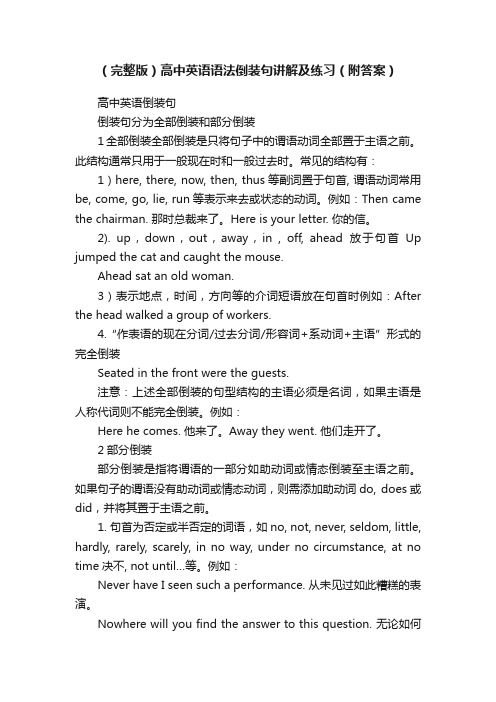
(完整版)高中英语语法倒装句讲解及练习(附答案)高中英语倒装句倒装句分为全部倒装和部分倒装1全部倒装全部倒装是只将句子中的谓语动词全部置于主语之前。
此结构通常只用于一般现在时和一般过去时。
常见的结构有:1)here, there, now, then, thus等副词置于句首, 谓语动词常用be, come, go, lie, run等表示来去或状态的动词。
例如:Then came the chairman. 那时总裁来了。
Here is your letter. 你的信。
2). up,down,out,away,in , off, ahead放于句首Up jumped the cat and caught the mouse.Ahead sat an old woman.3)表示地点,时间,方向等的介词短语放在句首时例如:After the head walked a group of workers.4.“作表语的现在分词/过去分词/形容词+系动词+主语”形式的完全倒装Seated in the front were the guests.注意:上述全部倒装的句型结构的主语必须是名词,如果主语是人称代词则不能完全倒装。
例如:Here he comes. 他来了。
Away they went. 他们走开了。
2部分倒装部分倒装是指将谓语的一部分如助动词或情态倒装至主语之前。
如果句子的谓语没有助动词或情态动词,则需添加助动词do, does或did,并将其置于主语之前。
1. 句首为否定或半否定的词语,如no, not, never, seldom, little, hardly, rarely, scarely, in no way, under no circumstance, at no time决不, not until…等。
例如:Never have I seen such a performance. 从未见过如此糟糕的表演。
倒装句讲解与练习(高中带答案解析)
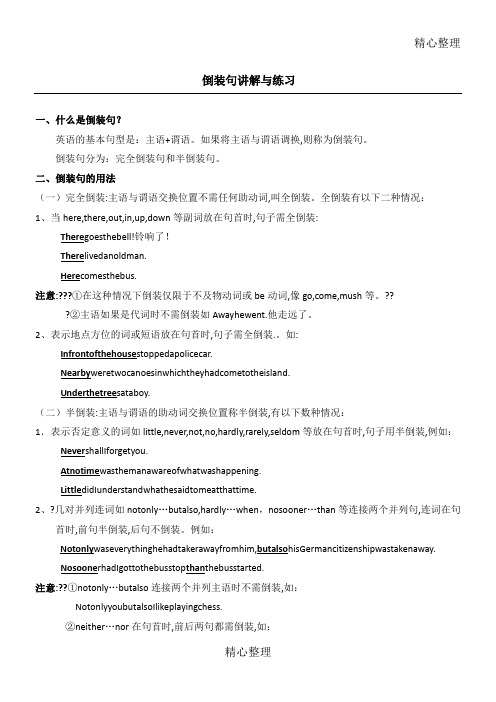
精心整理倒装句讲解与练习一、什么是倒装句?英语的基本句型是:主语+谓语。
如果将主语与谓语调换,则称为倒装句。
倒装句分为:完全倒装句和半倒装句。
二、倒装句的用法1注意212、?时,前句半倒装,后句不倒装。
例如:Notonly waseverythinghehadtakerawayfromhim,butalso hisGermancitizenshipwastakenaway.Nosoone rhadIgottothebusstop than thebusstarted.注意:??①notonly…butalso连接两个并列主语时不需倒装,如:NotonlyyoubutalsoIlikeplayingchess.②neither…nor在句首时,前后两句都需倒装,如:Neither doIhaveasister nor doesmyhusband.3、only放在句首强调状语时,主句用半倒装。
例如:Onlythen didIrealizethatIwaswrong.Onlyinthisway canIlearnfrommyfault.Onlywhenthewarwasoverin1918washeabletogetbacktowork.注意:only强调主语不倒装:如Onlytheteacherscanusetheroom.4、so…that句型,so放在句首时,主句用倒装结构,that从句不用倒装。
例如:5.倒装句练习题1.HismotherhadtalkedtohimformanyminuteswhilehewaswatchingTV,but____.A.alittledidhehear??B.littledidhehear??C.littleheardhe??D.alittleheardhe2.——Hello,ZhuHua.I’llhavetoreturntoCanadabecauseI’veworkedhereforayear. ——_____!A.Whattimeflies??B.Howtimeflies??C.Whatdoestimefly??D.Howdoestimefly3.Duringthewar,____butalsohelosthiswifeandhischild.4.6.10.——Whatsportdoyoulikebest?——Springboarddiving(跳板跳水).___todiveintowaterfromhighboard!A.Whatafunisit??B.Howfunitis??C.Howafunisit??D.Whatfunitis11.——Theoldmanwouldn’tstayathomeforarestevenifitrained.——____.Hewouldfeelsickifhestayedhomeforoneday.A.Sowouldmygrandpa???B.Sowouldn’tmygrandpaC.Neitherwouldmygrandpa??????D.Norwouldn’tmygrandpa12.___forustosurf(冲浪)ontheseainsummer!A.Whatexcitingisit??B.Howexcitingisit?C.Whatexcitingitis??D.Howexcitingitis13.Bynomeans___toourplanforthetrip.A.willsheagree??B.shewillagree??C.agreesshe??D.willagreeshe14.Thechildtiptoed(翘起脚尖走)quietlytothebird.___intotheforestwhenhewasabouttocatchit.A.Flewitaway??B.Awayflewit??C.Awayitflew??D.Flewawayit16.18.21.A.liesaverydeepvalley??B.doesaverydeepvalleylieC.averydeepvalleylies??D.averydeepvalleylays23.Theywentintoasmallhousebut___.A.nopersonsdidtheyfind????????B.notapersonfoundtheyC.notapersondidtheyfind???????D.notapersontheyfound24.——Mymotherdoesalotofhouseworkbeforegoingtowork,butshehasneverbeenlate.——_____.A.Sodoesmymother?B.Neitherdoesmymother?C.Norhasmymother?D.Soitiswithmymother25.Everyonehasarrivedateightand____.A.thendoesthemeetingbegin??B.thenbeginsthemeetingC.beginsthemeetingthen???????D.doesthemeetingbeginthen26.__itisforustoseethathedoeshisworksowell!28.30.33.MothertoldRosetobuysomesugarinthesupermarketand___.A.shedidso????B.soshedid??????C.sodidshe???????D.shedidsuch34.___shortlyafteritstoppedraining.A.Thereappearedacolorfulrainbowinthesky?B.IntheskydidacolorfulrainbowappearC.Thereacolorfulrainbowappearedinthesky?D.Thereintheskyacolorfulrainbowappeared35.Afterthepatientswentintotheoffice,__working.A.onlyadoctordidtheysee???B.onlyadoctorsawtheyC.onlyadoctortheysaw???????D.onlyadoctorhadtheyseen36.Wehavelookedforthelostsheepalmosteverywhere,butnowhere_____.A.wecanfindit???B.canwefindit???C.canfindweit???D.wecanitfind37.Onlysincetheygaveupthatgoodchance___toshowtheirinventionagain.39.40.A.sodoI????B.sowillI???C.nordoI???D.norwillI44.Sinceeveryonehascomebackhere,___.A.ongoesourdiscussion?????B.goesonourdiscussionC.ondoesourdiscussiongo??D.doesonourdiscussiongo45.__whenwepassedbyitsnest.A.Upintotheblueskydidthebirdfly?????B.UpintotheblueskythebirdflewC.Upintotheblueskyflewthebird????????D.Flewupintotheblueskythebird参考答案及讲解1.B。
高中倒装练习题及讲解及答案
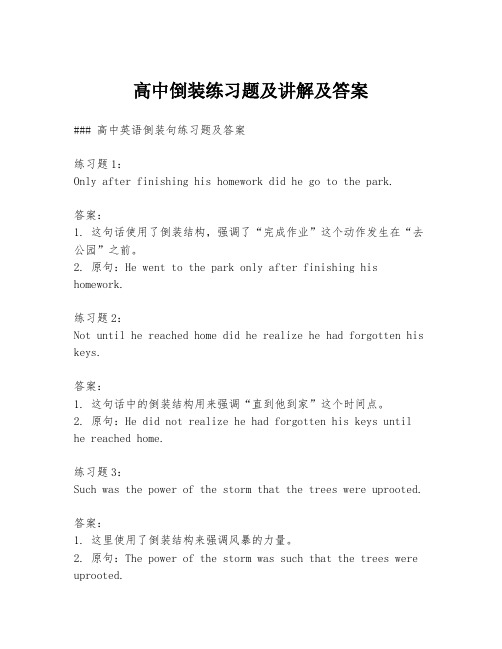
高中倒装练习题及讲解及答案### 高中英语倒装句练习题及答案练习题1:Only after finishing his homework did he go to the park.答案:1. 这句话使用了倒装结构,强调了“完成作业”这个动作发生在“去公园”之前。
2. 原句:He went to the park only after finishing his homework.练习题2:Not until he reached home did he realize he had forgotten his keys.答案:1. 这句话中的倒装结构用来强调“直到他到家”这个时间点。
2. 原句:He did not realize he had forgotten his keys until he reached home.练习题3:Such was the power of the storm that the trees were uprooted.答案:1. 这里使用了倒装结构来强调风暴的力量。
2. 原句:The power of the storm was such that the trees were uprooted.练习题4:Never have I seen such a beautiful sunset.答案:1. 这句话中的倒装结构用来强调“从未见过”。
2. 原句:I have never seen such a beautiful sunset.练习题5:Only by working hard can you achieve success.答案:1. 这句话中的倒装结构用来强调“只有通过努力工作”这个条件。
2. 原句:You can achieve success only by working hard.练习题6:So fast did the car move that we could hardly see it.答案:1. 这句话中的倒装结构用来强调车辆移动的速度。
英语倒装句精讲及习题(附答案)

英语倒装句精讲及习题(附答案)英语句子的自然语序是主语在前,谓语动词在后。
把谓语动词放在主语之前,就叫倒装结构。
如果全部谓语放在主语之前,叫全部倒装;只把助动词或情态动词放在主语之前就叫部分倒装。
一、完全倒装1.时间状语now,then等,地点状语here,there, out,in,up,down,away等副词位于句首①Here comes the bus. ②There goes the bell. ③Now comes your turn. ④Out went the children. 当代词作主语时,主谓语序不变。
例如:⑤Here it is. 在这儿。
⑥Here he comes. 他来了。
2.当句首状语为表示时间或地点的介词词组时,也常常引起全部倒装①在城市南部坐落着一家钢铁工厂。
South of the city lies a big steel factory.②从山谷里传来了一阵可怕的声音。
From the valley came a frightening sound.3.表语置于句首时,倒装结构为“表语+连系动词+主语”1)形容词+连系动词+主语出席会议的有怀特教授,史密斯教授,格林教授及其他嘉宾。
Present at the meeting were Professor White, Professor Smith, Professor Greenand many other guests2)过去分词+连系动词+主语他们可以随心所欲的日子过去了。
Gone are the days when they would do what they liked.二、部分倒装1.用于疑问句Do you speak English?2.If引导的条件状语从句谓语动词为were, had或should时,可省去if,把那三个词挪至句首。
Had you reviewed your lessons,you might have passed the examination.Were there enough hands, we should go on with the project.Should I be free tomorrow, I will come to the party.3.用于“形容词(或名词、动词)+as(though)引导的让步状语从句中”①Pretty as she is, she is not clever. ②Try as he could, he might fall again.如果从句的表语是名词,其名词前不加任何冠词。
高考语法复习:倒装句讲解及提升练习(有答案)
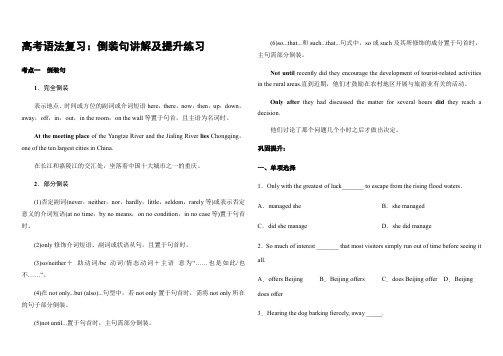
高考语法复习:倒装句讲解及提升练习考点一倒装句1.完全倒装表示地点、时间或方位的副词或介词短语here,there,now,then,up,down,away,off,in,out,in the room,on the wall等置于句首,且主语为名词时。
At the meeting place of the Yangtze River and the Jialing River lies Chongqing,one of the ten largest cities in China.在长江和嘉陵江的交汇处,坐落着中国十大城市之一的重庆。
2.部分倒装(1)否定副词(never,neither,nor,hardly,little,seldom,rarely等)或表示否定意义的介词短语(at no time,by no means,on no condition,in no case等)置于句首时。
(2)only修饰介词短语、副词或状语从句,且置于句首时。
(3)so/neither+助动词/be动词/情态动词+主语意为“……也是如此/也不……”。
(4)在not only...but (also)...句型中,若not only置于句首时,需将not only所在的句子部分倒装。
(5)not until...置于句首时,主句需部分倒装。
(6)so...that...和such...that...句式中,so或such及其所修饰的成分置于句首时,主句需部分倒装。
Not until recently did they encourage the development of touristrelated activities in the rural areas.直到近期,他们才鼓励在农村地区开展与旅游业有关的活动。
Only after they had discussed the matter for several hours did they reach a decision.他们讨论了那个问题几个小时之后才做出决定。
高中英语倒装句详解及练习(附答案)
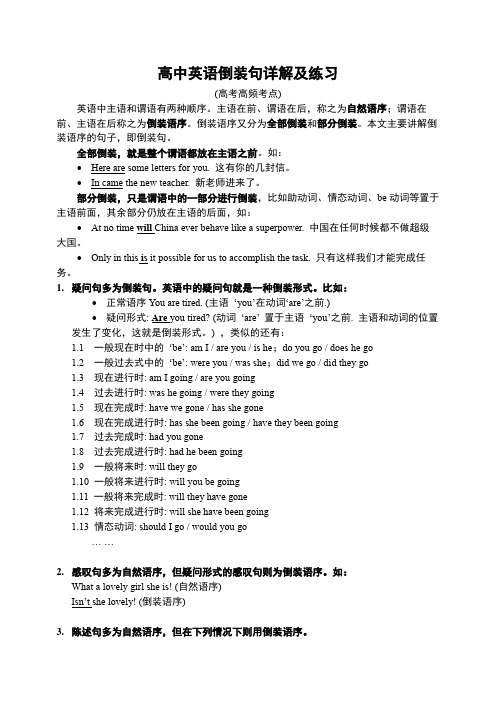
高中英语倒装句详解及练习(高考高频考点)英语中主语和谓语有两种顺序。
主语在前、谓语在后,称之为自然语序;谓语在前、主语在后称之为倒装语序。
倒装语序又分为全部倒装和部分倒装。
本文主要讲解倒装语序的句子,即倒装句。
全部倒装,就是整个谓语都放在主语之前。
如:•Here are some letters for you. 这有你的几封信。
•In came the new teacher. 新老师进来了。
部分倒装,只是谓语中的一部分进行倒装,比如助动词、情态动词、be动词等置于主语前面,其余部分仍放在主语的后面,如:•At no time will China ever behave like a superpower. 中国在任何时候都不做超级大国。
•Only in this is it possible for us to accomplish the task. 只有这样我们才能完成任务。
1.疑问句多为倒装句。
英语中的疑问句就是一种倒装形式。
比如:•正常语序You are tired. (主语‘you’在动词‘are’之前.)•疑问形式: Are you tired? (动词‘are’ 置于主语‘you’之前. 主语和动词的位置发生了变化,这就是倒装形式。
) ,类似的还有:1.1 一般现在时中的‘be’: am I / are you / is he;do you go / does he go1.2 一般过去式中的‘be’: were you / was she;did we go / did they go1.3 现在进行时: am I going / are you going1.4 过去进行时: was he going / were they going1.5 现在完成时: have we gone / has she gone1.6 现在完成进行时: has she been going / have they been going1.7 过去完成时: had you gone1.8 过去完成进行时: had he been going1.9 一般将来时: will they go1.10 一般将来进行时: will you be going1.11 一般将来完成时: will they have gone1.12 将来完成进行时: will she have been going1.13 情态动词: should I go / would you go… …2.感叹句多为自然语序,但疑问形式的感叹句则为倒装语序。
高中英语 倒装句讲解及巩固练习(有答案)
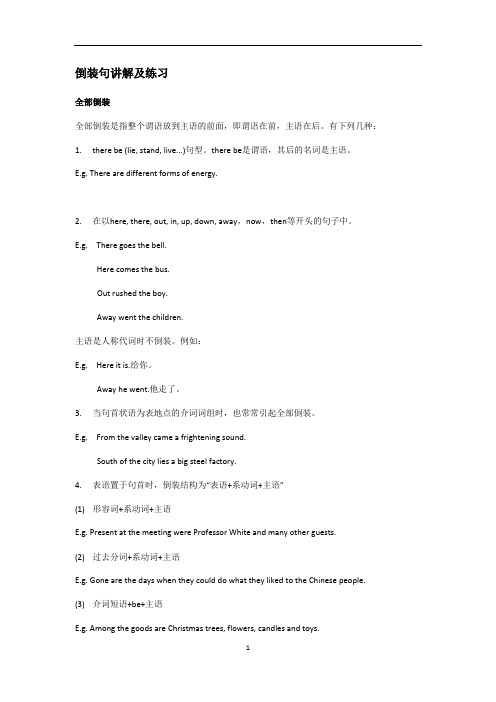
倒装句讲解及练习全部倒装全部倒装是指整个谓语放到主语的前面,即谓语在前,主语在后。
有下列几种:1.there be (lie, stand, live...)句型。
there be是谓语,其后的名词是主语。
E.g. There are different forms of energy.2.在以here, there, out, in, up, down, away,now,then等开头的句子中。
E.g. There goes the bell.Here comes the bus.Out rushed the boy.Away went the children.主语是人称代词时不倒装。
例如:E.g. Here it is.给你。
Away he went.他走了。
3.当句首状语为表地点的介词词组时,也常常引起全部倒装。
E.g. From the valley came a frightening sound.South of the city lies a big steel factory.4.表语置于句首时,倒装结构为“表语+系动词+主语”(1)形容词+系动词+主语E.g. Present at the meeting were Professor White and many other guests.(2)过去分词+系动词+主语E.g. Gone are the days when they could do what they liked to the Chinese people.(3)介词短语+be+主语E.g. Among the goods are Christmas trees, flowers, candles and toys.5.such置于句首时E.g. Such was Albert Einstein, a simple man and the 20th century’s greatest scientist.此句型中的such多被认为是表语,所以such后面的be动词应该与其后的“真正主语”保持一致。
高中英语语法倒装句专题讲解(有答案)
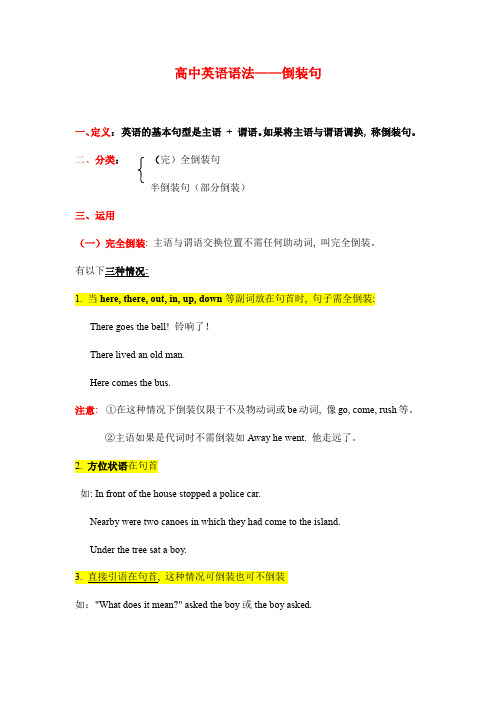
高中英语语法——倒装句一、定义:英语的基本句型是主语+ 谓语。
如果将主语与谓语调换, 称倒装句。
二、分类:(完)全倒装句半倒装句(部分倒装)三、运用(一)完全倒装: 主语与谓语交换位置不需任何助动词, 叫完全倒装。
有以下三种情况:1. 当here, there, out, in, up, down等副词放在句首时, 句子需全倒装:There goes the bell! 铃响了!There lived an old man.Here comes the bus.注意:①在这种情况下倒装仅限于不及物动词或be动词, 像go, come, rush等。
②主语如果是代词时不需倒装如Away he went. 他走远了。
2. 方位状语在句首如: In front of the house stopped a police car.Nearby were two canoes in which they had come to the island.Under the tree sat a boy.如:"What does it mean?" asked the boy或the boy asked.(二)半倒装: 主语与谓语的助动词交换位置称半倒装,有以下数种情况:1. 否定意义的词在句首, 句子半倒装【little, never, not, no, hardly, rarely, seldom】例:Never shall I forget you.At no time and in no circumstances will China be the first to use nuclear weapons.在任何时候任何情况下中国都不会首先使用核武器。
Little did I understand what he said to me at that time.2. 几对并列连词not only…but also, hardly… when等连接两个并列句, 连词在Not only was everything he had taken away from him, but also his German citizenship was taken away.No sooner had I got to the bus stop than the bus started.注意:①not only…but also连接两个并列主语时不需倒装如: Not only you but also I like playing chess.②neither…nor在句首时, 前后两句都需倒装如:Neither do I have a sister nor does my husband.3. only在句首强调状语,主句半倒装:如:Only then did I realize that I was wrong.Only in this way can I learn from my fault.Only when the war was over in 1918, was he able to get back to work.注意: only强调主语不倒装:Only the teachers can use the room.4. so…that句型, so在句首时, 主句倒装, that从句不倒装:如:So easy is it that a child can learn it.So hard did he work that he finally won the fame.I saw the film, so did he.5.省略了if的虚拟条件句如:Had I been informed earlier, I could have done something.Were she here, she would support the motion.【典型例题】1. _____can you expect to get a pay rise.A. With hard workB. Although work hardC. Only with hard workD. Now that he works hard2. Seldom ____ any mistakes during my past few years of working here.A. would I makeB. did I makeC. I did makeD. shall I make3. Not until all the fish died in the river, _____ how serious the pollution was.A. did the villagers realizeB. the villagers realizedC. the villagers did realizeD. didn’t the villagers realize4. Not until I began to work ____ how much time I had wasted.A. didn’t realizeB. did I realizeC. I didn’t realizeD. I realized5.—Do you know Jim quarrel with his brother?—I don’t know, _______.A. nor don’t I careB. nor do I careC. I don’t care neitherD. I don’t care also6. Only by practicing a few hours every day _____ be able to waste much time.A. you canB. can youC. you willD. will you7. Not until the early years of the19th century ___ what heat is.A. man did knowB. man knewC. didn’t man knowD. did man know8. _____got into the room, _____ the telephone rang.A. He hardly; thenB. Hardly had he; whenC. He had not; thanD. Not had he; when9. Only in this way ______ do it well.A. must weB. we couldC. can weD. we can10.—I don’t think I can walk any further.—_____, Let’s stop here for a rest.A. Neither can IB. Neither do IC. I didn’t think soD. I think so答案:CBABB DDBBB【课后巩固】1.His mother had talked to him for many minutes while he was watching TV, but _.A. a little did he hearB. little did he hearC. little heard heD. a little heard heB2 _____the plane.A. Flew downB. Down flewC. Down was flyingD. Down flyB3. During the war, ____but also he lost his wife and his child.A. not was his job in the lab taken awayB. not only was his job in the lab taken awayC. not merely his job in the lab was taken awayD. not just was taken away his job in the labB2. What sport do you like best?—— Springboard diving (跳板跳水).——____to dive into water from high board!A. What a fun is itB. How fun it isC. How a fun is itD. What fun it isD5. I think this is the first time that we have met.___anywhere.A. Before have we never seen each otherB. Never before we have seen each otherC. Each other have we seen never beforeD. Never before have we seen each otherD6.—— We have to stop talking here outside. Listen,_____!—— Hurry up, or we’ll be late.A. There goes the bellB. There does the bell goC. There the bell goesD. Goes the bell thereA7. ______ snacks and drinks,but they also brought cards for entertainment when they had a picnic in the forest.A. Not only they broughtB. Not only did they bringC. Not only brought theyD. Not only they did bringB8. She didn’t come to the party last Sunday.___, she must have made the party more exciting.A. If she cameB. Would she comeC. Had she comeD. Did she comeC9. Hardly ____ when it began to rain.A. had he arrivedB. arrived heC. he had arrivedD. did he arriveC10. I received his mother’s telephone call at eleven.__that he was badly hurt in an accident yesterday.A. Then did I knowB. Only then I knewC. Only then did I knowD. Only then knew IC11. There ____ .A. come theyB. they comeC. they are comeD. they will comeB12. ______, I would have given you his address.A. If you asked meB. You had asked meC. Should you have asked meD. Had you asked meD13. Only when you have finished your homework ___ go home.A. can youB. would youC. you willD. you canA14. Many a time _____ me good advice.A. he gaveB. does he giveC. he has givenD. has he givenD15. Hardly _____ when the bus suddenly pulled away.A. they had got to the bus stopB. they got to the bus stopC. did they get to the bus stopD. had they got to the bus stopD16. ____ have I seen a better performance.A. EverywhereB. somewhereC. Everywhere elseD. NowhereD17. Only when class began ___ that he had left his book at home.A. will he realizeB. he did realizeC. did he realizeD. should he realizeC18. Only in an hour ago ____ out why he was absent.A. did the teacher foundB. the teacher foundC. did the teacher findD. had the teacher foundC19. Not a single word ____ at the beginning.A. did he sayB. has he saidC. he saidD. he has said A20. ______ that I couldn’t be absorbed in the work.A. They made such talkedB. So loudly they talkedC. It was noise outsideD. Such a loud noise did they make D21. ______ that he could not speak for a long time.A. So frightened was heB. So frightened he wasC. Was he so frightenedD. Frightened was heA22. Not only ______ a promise, but he also kept it.A. had he madeB. he had madeC. did he makeD. he makesC23. ______ I had time, I would have run round that lake again.A. IfB. UnlessC. HadD. WhenC。
英语倒装句专题练习(及答案)含解析
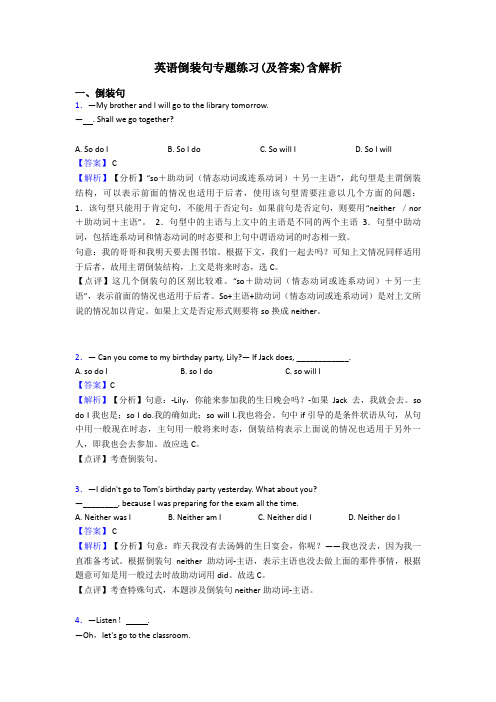
英语倒装句专题练习(及答案)含解析一、倒装句1.—My brother and I will go to the library tomorrow.— . Shall we go together?A. So do IB. So I doC. So will ID. So I will【答案】 C【解析】【分析】“so+助动词(情态动词或连系动词)+另一主语”,此句型是主谓倒装结构,可以表示前面的情况也适用于后者,使用该句型需要注意以几个方面的问题:1.该句型只能用于肯定句,不能用于否定句:如果前句是否定句,则要用“neither /nor +助动词+主语”。
2.句型中的主语与上文中的主语是不同的两个主语3.句型中助动词,包括连系动词和情态动词的时态要和上句中谓语动词的时态相一致。
句意:我的哥哥和我明天要去图书馆。
根据下文,我们一起去吗?可知上文情况同样适用于后者,故用主谓倒装结构,上文是将来时态,选C。
【点评】这几个倒装句的区别比较难。
“so+助动词(情态动词或连系动词)+另一主语”,表示前面的情况也适用于后者。
So+主语+助动词(情态动词或连系动词)是对上文所说的情况加以肯定。
如果上文是否定形式则要将so换成neither。
2.— Can you come to my birthday party, Lily?— If Jack does, ____________.A. so do IB. so I doC. so will I【答案】C【解析】【分析】句意:-Lily,你能来参加我的生日晚会吗?-如果Jack去,我就会去。
so do I我也是;so I do.我的确如此;so will I.我也将会。
句中if引导的是条件状语从句,从句中用一般现在时态,主句用一般将来时态,倒装结构表示上面说的情况也适用于另外一人,即我也会去参加。
故应选C。
【点评】考查倒装句。
3.—I didn't go to Tom's birthday party yesterday. What about you?—________, because I was preparing for the exam all the time.A. Neither was IB. Neither am IC. Neither did ID. Neither do I【答案】 C【解析】【分析】句意:昨天我没有去汤姆的生日宴会,你呢?——我也没去,因为我一直准备考试。
高中英语语法倒装句讲解及练习(附答案)
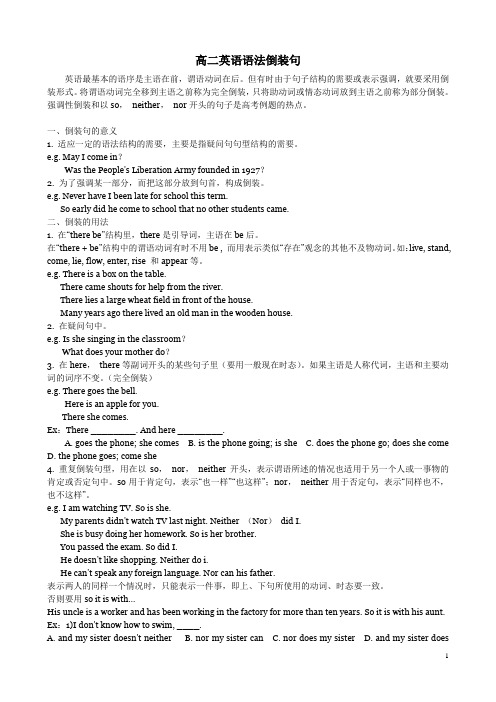
高二英语语法倒装句英语最基本的语序是主语在前,谓语动词在后。
但有时由于句子结构的需要或表示强调,就要采用倒装形式。
将谓语动词完全移到主语之前称为完全倒装,只将助动词或情态动词放到主语之前称为部分倒装。
强调性倒装和以so,neither,nor开头的句子是高考例题的热点。
一、倒装句的意义1. 适应一定的语法结构的需要,主要是指疑问句句型结构的需要。
e.g. May I come in?Was the People's Liberation Army founded in 1927?2. 为了强调某一部分,而把这部分放到句首,构成倒装。
e.g. Never have I been late for school this term.So early did he come to school that no other students came.二、倒装的用法1. 在“there be”结构里,there是引导词,主语在be后。
在“there + be”结构中的谓语动词有时不用be , 而用表示类似“存在”观念的其他不及物动词。
如:live, stand, come, lie, flow, enter, rise 和appear等。
e.g. There is a box on the table.There came shouts for help from the river.There lies a large wheat field in front of the house.Many years ago there lived an old man in the wooden house.2. 在疑问句中。
e.g. Is she singing in the classroom?What does your mother do?3. 在here,there等副词开头的某些句子里(要用一般现在时态)。
高中英语语法倒装句讲解及练习(附答案)
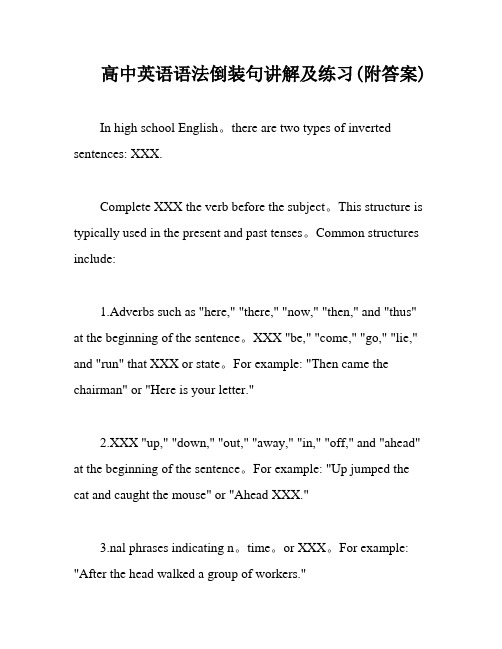
高中英语语法倒装句讲解及练习(附答案)In high school English。
there are two types of inverted sentences: XXX.Complete XXX the verb before the subject。
This structure is typically used in the present and past tenses。
Common structures include:1.Adverbs such as "here," "there," "now," "then," and "thus"at the beginning of the sentence。
XXX "be," "come," "go," "lie," and "run" that XXX or state。
For example: "Then came the chairman" or "Here is your letter."2.XXX "up," "down," "out," "away," "in," "off," and "ahead" at the beginning of the sentence。
For example: "Up jumped thecat and caught the mouse" or "Ahead XXX."3.nal phrases indicating n。
(完整版)高中英语语法倒装句讲解及练习(附答案)
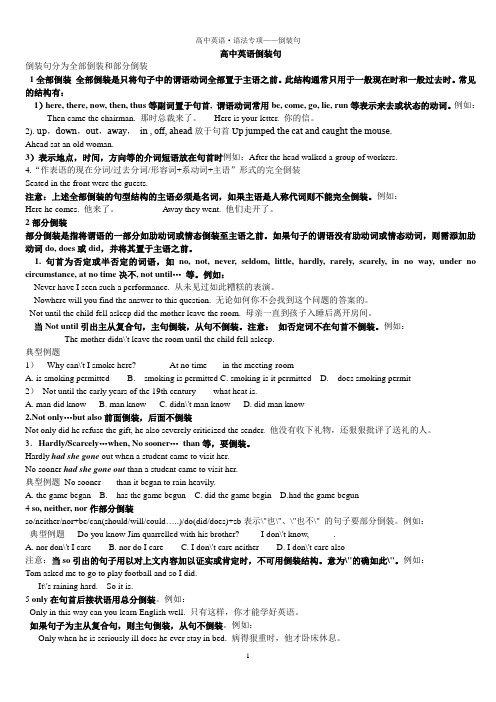
高中英语倒装句倒装句分为全部倒装和部分倒装1全部倒装全部倒装是只将句子中的谓语动词全部置于主语之前。
此结构通常只用于一般现在时和一般过去时。
常见的结构有:1)here, there, now, then, thus等副词置于句首, 谓语动词常用be, come, go, lie, run等表示来去或状态的动词。
例如:Then came the chairman. 那时总裁来了。
Here is your letter. 你的信。
2). up,down,out,away,in , off, ahead放于句首Up jumped the cat and caught the mouse.Ahead sat an old woman.3)表示地点,时间,方向等的介词短语放在句首时例如:After the head walked a group of workers.4.“作表语的现在分词/过去分词/形容词+系动词+主语”形式的完全倒装Seated in the front were the guests.注意:上述全部倒装的句型结构的主语必须是名词,如果主语是人称代词则不能完全倒装。
例如:Here he comes. 他来了。
Away they went. 他们走开了。
2部分倒装部分倒装是指将谓语的一部分如助动词或情态倒装至主语之前。
如果句子的谓语没有助动词或情态动词,则需添加助动词do, does或did,并将其置于主语之前。
1. 句首为否定或半否定的词语,如no, not, never, seldom, little, hardly, rarely, scarely, in no way, under no circumstance, at no time决不, not until…等。
例如:Never have I seen such a performance. 从未见过如此糟糕的表演。
Nowhere will you find the answer to this question. 无论如何你不会找到这个问题的答案的。
- 1、下载文档前请自行甄别文档内容的完整性,平台不提供额外的编辑、内容补充、找答案等附加服务。
- 2、"仅部分预览"的文档,不可在线预览部分如存在完整性等问题,可反馈申请退款(可完整预览的文档不适用该条件!)。
- 3、如文档侵犯您的权益,请联系客服反馈,我们会尽快为您处理(人工客服工作时间:9:00-18:30)。
高中英语倒装句倒装句分为全部倒装和部分倒装1 全部倒装全部倒装是只将句子中的谓语动词全部置于主语之前。
此结构通常只用于一般现在时和一般过去时。
常见的结构有:1)here, there, now, then, thus等副词置于句首 , 谓语动词常用 be, come, go, lie, run等表示来去或状态的动词。
例如:Then came the chairman. 那时总裁来了。
Here is your letter. 你的信。
2). up,down,out,away, in , off, ahead 放于句首 Up jumped the cat and caught the mouse.Ahead sat an old woman.3)表示地点,时间,方向等的介词短语放在句首时例如:After the head walked a group of workers.4.“作表语的现在分词 /过去分词 /形容词 +系动词 +主语”形式的完全倒装Seated in the front were the guests.注意:上述全部倒装的句型结构的主语必须是名词,如果主语是人称代词则不能完全倒装。
例如:Here he comes. 他来了。
Away they went. 他们走开了。
2 部分倒装部分倒装是指将谓语的一部分如助动词或情态倒装至主语之前。
如果句子的谓语没有助动词或情态动词,则需添加助动词 do, does或 did,并将其置于主语之前。
1. 句首为否定或半否定的词语,如 no, not, never, seldom, little, hardly, rarely, scarely, in no way, under no circumstance, at no time决不 , not until 等⋯。
例如:Never have I seen such a performance从.未见过如此糟糕的表演。
Nowhere will you find the answer to this question. 无论如何你不会找到这个问题的答案的。
Not until the child fell asleep did the mother leave the room. 母亲一直到孩子入睡后离开房间。
当 Not until 引出主从复合句,主句倒装,从句不倒装。
注意:如否定词不在句首不倒装。
例如:The mother didn\'t leave the room until the child fell asleep.典型例题1) ---Why can\'t I smoke here?----At no time___ in the meeting-roomA. is smoking permittedB. smoking is permittedC. smoking is it permittedD. does smoking permit 2) Not until the early years of the 19th century ___ what heat is.A. man did knowB. man knowC. didn\'t man knowD. did man know 2.Notonly ⋯ but also前面倒装,后面不倒装Not only did he refuse the gift, he also severely criticized the sender.他没有收下礼物,还狠狠批评了送礼的人。
3. Hardly/Scarcely⋯when, No sooner⋯等than,要倒装。
Hardly had she goneout when a student came to visit her.No sooner had she gone outthan a student came to visit her.典型例题No sooner___ than it began to rain heavily.A. the game beganB. has the game begunC. did the game beginD.had the game begun4 so, neither, nor作部分倒装so/neither/nor+be/can(should/will/could⋯ ..)/do(did/does)+sb表示\"也\"、\"也不 \" 的句子要部分倒装。
例如:典型例题---Do you know Jim quarrelled with his brother?---I don\'t know, _____.A. nor don\'t I careB. nor do I careC. I don\'t care neitherD. I don\'t care also注意:当 so 引出的句子用以对上文内容加以证实或肯定时,不可用倒装结构。
意为\"的确如此 \"。
例如:Tom asked me to go to play football and so I did.---It\'s raining hard.---So it is.5 only 在句首后接状语用总分倒装。
例如:Only in this way can you learn English well. 只有这样,你才能学好英语。
如果句子为主从复合句,则主句倒装,从句不倒装。
例如:Only when he is seriously ill does he ever stay in bed.病得狠重时,他才卧床休息。
注意:如果 only 后的词组不是状语,不需倒装。
e.g. Only Wang Lili knows this. onlyOnly a few young men went to the theatre. (修饰主语时则不用倒装)Ex: 1)Only in this way ___ make progress in your English. A. you B. can you C. you be able to D. will you able to2) Only when the meeting was over___ go back to meet his friend. A. he could B. he was able to C. was he able to D. was able to he3)Only after liberation___ to be treated as human beings.A.did they beginB. they had begunC.they did beginD. had they begun6 as, though 引导的倒装句as / though引导的让步从句必须将表语或状语提前(形容词, 副词 , 分词 , 实义动词提前)。
但需注意:1)句首名词不能带任何冠词。
Child as he is, he seems to know everything(.child 前不加冠词注意:让步状语从句中,有though,although 时,后面的主句不能有but,但是though 和 yet 可连用。
7.so⋯ that 句型中的 so 位于句首时,需倒装。
例如:So frightened was he that he did not dare to move an inch他.害怕得很,动也不敢动。
Light travels so fast that it is difficult for us to imagine its speed.=So fast does light travel that it is difficult for us to imagine its speed.8. So + 形容词、副词及 such 置于句首时要倒装。
So happy did he feel.Such was me.9. 在某些表示祝愿的句型中。
例如:May you all be happy. 愿你们都快乐。
10.在虚拟语气条件句中从句谓语动词有 were, had, should 等词,可将 if 省略,把 were, had, should 移到主语之前,采取部分倒装。
例如: Were I you, I would try it again. 我是你的话,就再试一次。
11."分词 (代词 ) + be + 主语 "结构。
如 :Walking at the head of the line was our teacher.Such was the story he told me.done 做形容词在句中做表语时,常把表语放在句首,要用倒装句式。
Goneforever are the days when the Chinese people had to use foreign oil.12.为了保持句子的平蘅或为了强调表语和状语,或使上下文紧密衔接,把它们放在句首用倒装句。
该结构不需加助动词。
East of the town lies a beautiful lake.In a lecture hall of a university in England sits a professor.Outside the doctor ’ s clinic were twenty patients.倒装句练习:选择填空 :1. ─ You like singing and dancing. A.So─ do I . B.So I do C.I do so D.do I so2.Her mother is a warm-hearted old lady. ____ 。
A.So my mother is B.So is my motherC.Is my mother soD.my mother so is3.The fairy story "Snow White" is very interesting. ____.A.So it is B.So is it C.it is so D.is it so4.You didn't go for an outing at the seashore. ____.A.Neither do I B.Neither did I C.I didn't neither D.Did neither I5.Marx was born in Germany,and German was his native language. ____.A.So it was with EngelsB.So was EngelsC.So Engels wasD.Was Engels so6. ─ Look.There ____. ─ Oh, there es the bus; comes it B.the bus comes; it comes7.Not until ____ sixteen ____ to school.A.he was; did he go B.he was; he went C.was he; he did go D.washe; went he8.Not until the next morning ____. A.did Mary come back B.Mary came back C.came Mary back D.came back Mary9.Hardly ____ when it began to rain.A.had he got home B.he had got home C.had got home he D.he home had got10.No sooner ____ than he fell asleep.A.his head had touched the pillowB.had his head touched the pillowC.touched the pillow his head hadD.touched the pillow had his head11.Little ____.A.did I think of it B.I thought of it C.did think I of it D.thought of it I12.Seldom ____.A.LiLi her feelings showed B.did show LiLi her feelingsC.LiLi showed her feelingsD.did LiLi show her feelings13.Never before in her life ____ such beautiful and precious jewelry.A.he saw B.did he see C.has she seen D.she has seen14.Many a time ____ the chess competition.A.had taken he part inB.he taken part in hadC.had he taken part inD.he had taken part in15.So busy ____ that he has no time to spare.A.he was B.was he C.he is D.is he16.____ with a bunch of flowers in her hand.A.A girl in cameB.Came in a girlC.In came a girlD.A girl came in17.Out ____.A.from behind a tall tree ran a little boyB.from behind a tall tree a little boy ranC.ran a little boy from behind a tall treeD.a little boy ran from behind a tall tree18.In the clear blue sky ____.A.does shine the bright moon.B.the bright moon does shineC.shines the bright moonD.the bright moon shines19.Only in this way ____.A.we can well do itB.can we well do it c.we can do it well D.can we do it well20.Only when he has finished his homework ____.A.is able to he play with his friends for a whileB.he able to play with is his friends for a whileC.is he able to play with his friends for a whileD.he is able to play with his friends for a while21.____, he continued his study.te as it wasB.As it was latete although it wasD.Although was it late22.Next door to us ____.A.lives an old man,who is an overseas ChineseB.does an old man live,who is an overseas ChineseC.an old man lives who is an overseas ChineseD.an old man who is an overseas Chinese does live23.____ as young as you, I would study hard.A.Was I B.Were I C.If I am D.If I was24.____ so hard, they wouldn't have won such great success.A.Hasn't they trainedB.If they hasn't trainC.Hadn't they trainedD.If they didn't train25.Not a single word ____ when he left.A.did speak he B.spoke he C.did he speak D.he spoke26. ─ I don't think I can walk any further.─ ____. Let's stop here for a rest."A.Neither am IB.Neither can IC.I think soD.I don't think so27.Be quick! ____.A.The bus comes here B.The bus here comes C.Here the bus comes D.Here comes the bus28.John's not been to London. ____A.Ben isn't either B.Neither is Ben C.Nor Ben has D.Neither has Ben29.The doctor asked Charlie to breathe deeply. ____.A.Charlie does so B.Charlie did so C.So does CharlieD.So did Charlie30.____, he does not know the answer.A.As Mr Smith is a teacherB.As Mr Smith is teacherC.A teacher as Mr Smith isD.Teacher as Mr Smith is31.____ so busy,I should go with you.A.Were I not B.Was I not C.If I am not D.I were not32.In the front of the classroom ____.A.is the desk for the teacherB.has the desk of the teactherC.it is a desk for the teacherD.has it a desk of the teacher33.On the top of the hill ____. A.does a temple stand B.a temple stands there C.stands a temple D.a temple stands34.Not only ____ but also she likes singing. A.she likes painting B.does she like painting C.likes painting she D.she does like painting35.Now ____. es your turn B.does your turn come C.your turn comes D.your turn does come36. ____ happy. A.You may be B.May you be C.Be you may D.May be you37.The students have learned a lot from the workers and ____.A.so the teachers haveB.have the teachers soC.so have the teachersD.have so the teachers1._______ and caught the mouse. A. Up the cat jumped B. The cat up jumped C. Up jumped the cat D. Jumped up the cat2.______ and the lesson began. A. In came Mr Brown B. Mr Brown in came C. In came he D. came in Mr Brown3.Over _______ , dead. A. rolling the goat B. rolled the goat C. did the goat roll D. the goat rolled4.— Where is my shirt, mum? —_________. A. There is it B. There it is C. There is D. Here is it5.—Where is your father?—Oh, ________.A. here he comesB. he here comesC. here does he comeD. here comeshe 6.The door opened and there ________ .A. enters an old manB. entered an old manC. did an old man enterD. an old man entered7.Now ______ your turn to recite the text. A. will come B. comes C. has come D. there is8.Often _____ them not to smoke here. A. we advised B. advised me C. did we advise D. had we advised9. ________ playing soldiers.A. Inside the room were two boys B. Inside the room two boysC. Were two boys inside the roomD. Inside the room was two boys10.On the wall _______ two large portraits.A. are hanging B .Hanged C. hang D. hangs11._______ who was wounded in the stomach.A. Among them were a soldierB. Among them was a soldierC. Among them a soldier wasD. Among they was a soldier12. Next door to ours ________ , who is no less than eighty.A. that lives an old manB. does an old man liveC. lives an old manD. where lives an oldman 13.She plays the piano very well, ______.A. so every one of us doesB. every one of us doesC. so does every one of usD. so do every one ofus 14.You say he works hard, ______, and _____.A. so he does; so you doB. so he does; so do youC. so does he; so do youD. so does he; so you do15.—I thought you women were present at the meeting—.__________.A. So we wereB. So we didC. So were weD. So did we16.I don’ t think Jack will come today, _____. A. nor will Mary B. and Mary doesn’C.t Mary will either D. or Mary does17. She is fond of cooking, _____I . A. so am B. nor am C. neither do D. nor do18.Marx was born in Germany and German was his native language.A. So it was with EnglesB. So was it with EnglesC. So was EnglesD. So did Engles19.A fish needs water and without water it will die._______.A. So does a manB. So will a manC. So it is with a manD. So is it with a man20. So absorbed _______ the work that she often forgot to _____ her meals.A. had she been in; doB. she was in; makeC. was she in; takeD. she had been in ;have 21.So loudly ______ that every one of the class could hear him.A. did he speakB. did he spokeC. spoke heD. he spoke22. __________ his apperance that no one could recognize him.A. Strange so wasB. So strange wasC. Was so strangeD. So was strange23.Not once ______ their plan.A. did they change B. they changed C. changed they D. they did change24.Never ______ such a wonderful place as Hangzhou. A. are seeing B. had I seen C. I have seen D. haveI seen25.Seldom ______ TV during the day. A. they watch B. are they watching C. have they watched D. dothey watch26.Nowhere ______ as in my garden.A. the flowers were so beautifulB. were the flowers so beautifulC. so beautiful were the flowersD. so beautiful the flowers were27. Hardly ________ his homework when he went out.A. finished heB. he had finishedC. did he finishD. had he finished28.Scarcely _____ finished their homework ______ I came into the classroom.A. had they; thanB. they had; whenC. had they; whenD. did they;when 29. Not only _______ a promise, but also he kept it.A. has he madeB. does he makeC. he madeD. did he make30.Not until his comrades criticized him _______ to admit his mistake.A. had he begunB. began heC. did he beginD. does he begin。
